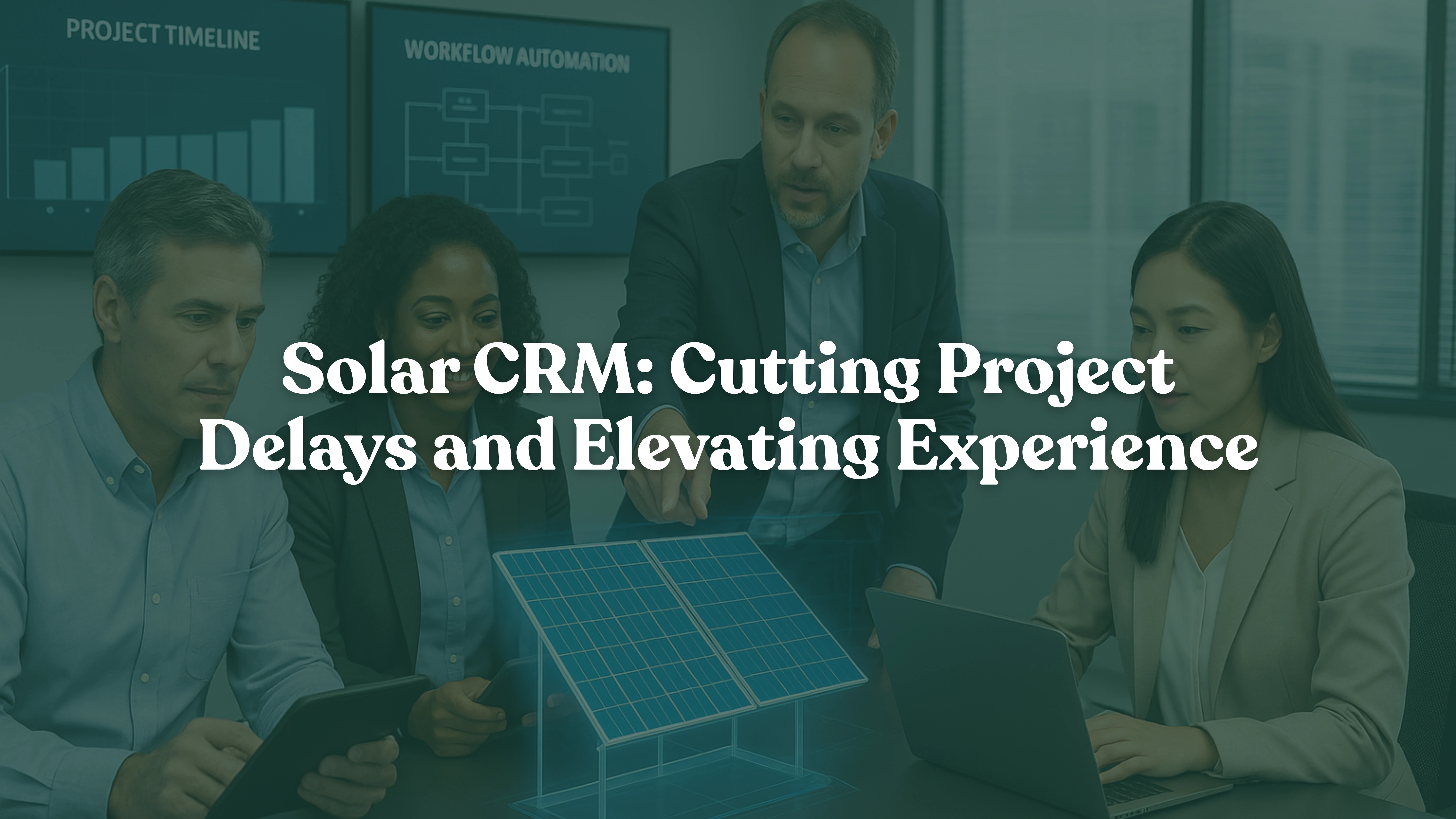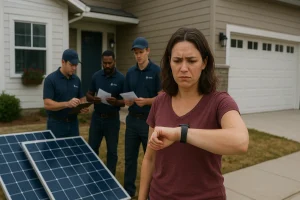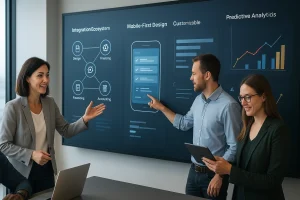How a Solar CRM Cuts Project Delays and Improves Customer Experience

How Solar CRM Reduces Delays and Enhances Customer Experience
The solar industry is booming, with installations growing 51% from 2022 to 2023, but this rapid expansion has created a challenging paradox. While demand soars, solar installers and EPCs face mounting pressure from project delays, frustrated customers, and complex workflows that can derail even the most promising installations. The average solar project now takes 6+ months from contract to completion, with permitting delays, communication gaps, and disconnected systems causing customer satisfaction scores to plummet. However, specialized solar CRM software emerges as the game-changing solution that streamlines operations, automates critical workflows, and delivers the transparent, professional customer experience that today’s homeowners expect—turning project chaos into competitive advantage.
The Hidden Cost of Project Delays in Solar Installation
Solar project delays aren’t just inconveniences—they’re business killers. About 1 in 10 rooftop solar photovoltaic customers who sign a contract cancel before installation, with project delays being a primary driver. These cancellations devastate installer profitability and damage long-term customer relationships.

Common causes of solar project delays include:
- Permitting and interconnection bottlenecks (affecting 67% of projects)
- Manual data transfer between sales and operations teams
- Poor communication during the installation timeline
- Disconnected systems requiring duplicate data entry
- Lack of real-time project visibility for customers
Colorado installers report that utility delays alone can extend projects by six months or more, highlighting how external factors compound internal inefficiencies. When customers can’t track progress or receive timely updates, trust erodes rapidly.
Why Traditional Project Management Falls Short for Solar EPCs
Generic CRM platforms and spreadsheet-based systems create more problems than they solve for solar businesses. Operating a solar company without a high-quality CRM platform can be a bit like sprinting in high-heeled shoes — sure, you could do it, but it’s pretty inefficient and could seriously hold you back.
Key limitations of non-specialized systems:
- No Solar-Specific Workflows: Generic CRMs lack understanding of permitting stages, utility interconnection processes, and solar financing requirements
- Data Silos: Sales teams use one system, project managers another, creating communication breakdowns
- Manual Process Dependencies: Critical handoffs between departments rely on human intervention, increasing error rates
- Limited Customer Transparency: Customers remain in the dark about project status, leading to anxiety and complaints
Solar projects involve multiple stages from site surveys to ongoing maintenance, and many companies struggle with disconnected systems that force teams to manually transfer data between specialized tools, leading to errors and delays.
How Solar CRM Software Transforms Project Management
Modern solar CRM platforms revolutionize how installers and EPCs manage the complete customer lifecycle. Unlike generic solutions, solar-specific CRMs understand the unique workflows, compliance requirements, and customer expectations that define successful solar installations.

Automated Workflow Management
Solar CRM systems automate critical processes that traditionally cause bottlenecks:
- Intelligent Task Sequencing: Automatically trigger next steps when previous phases complete
- Document Management: Store permits, contracts, and technical specifications in centralized locations
- Timeline Optimization: Real-time scheduling adjustments based on crew availability and weather conditions
- Compliance Tracking: Built-in reminders for inspection deadlines and utility requirements
Scoop automates sales-to-ops handoffs, ensuring seamless execution with zero manual data entry, eliminating the communication gaps that cause project delays.
Enhanced Customer Communication
Proactive communication transforms customer experience by addressing concerns before they escalate. Consumers are now used to getting their questions answered immediately, and they come into their solar project with the expectation that their installation will be just as transparent.
Solar CRMs enable:
- Automated Status Updates: Customers receive real-time notifications about project milestones
- Customer Portals: Self-service access to project timelines, documents, and payment information
- Educational Content Delivery: Automated sharing of relevant guides and FAQs during each project phase
- Proactive Issue Resolution: Early warning systems for potential delays with explanatory messaging
Real-World Impact: Solar CRM Success Metrics
Installers using specialized solar CRM software report dramatic improvements:
- 40% reduction in project completion time through automated workflows
- 55% decrease in customer service calls via proactive communication
- 67% improvement in customer satisfaction scores with transparent project tracking
- 80% reduction in manual data entry errors through system integration

SurgePV users report a 40% increase in deal close rates, and reduce proposal creation time from 3+ hours to under 30 minutes, demonstrating how comprehensive platforms impact the entire sales-to-installation process.
Specific Benefits for EPCs and Installers
For Engineering, Procurement, and Construction companies, solar CRMs provide:
- Resource Optimization: Intelligent crew scheduling based on project requirements and skill sets
- Supply Chain Integration: Automated material ordering tied to project timelines
- Quality Control: Digital checklists and photo documentation for each installation phase
- Financial Tracking: Real-time profitability analysis per project
For Solar Installers, key advantages include:
- Lead-to-Installation Continuity: Seamless handoffs between sales, design, and installation teams
- Mobile Field Access: Real-time data access for crews with offline capabilities
- Customer Retention: Post-installation service management and monitoring integration
- Scalability: Systems that grow with business expansion without performance degradation
Essential Features of High-Performance Solar CRM Systems
When evaluating solar CRM platforms, prioritize these critical capabilities:
Integration Ecosystem
A robust Solar CRM should seamlessly integrate with tools across your entire solar workflow from sales to install, including solar design tools, financing platforms, project management apps, and accounting software.
Mobile-First Design
Field teams need real-time access to project data, customer information, and documentation. Mobile functionality isn’t optional—it’s essential for modern solar operations.

Customizable Workflows
Every solar business operates differently. Look for platforms that adapt to your specific processes rather than forcing you into rigid templates.
Predictive Analytics
Advanced solar CRMs use AI to identify potential delays before they occur, enabling proactive intervention and customer communication.
Implementation Best Practices for Solar CRM Success
Successful solar CRM deployment requires strategic planning:
- Process Mapping: Document existing workflows before implementation to identify improvement opportunities
- Team Training: Invest in comprehensive training for all user groups, from sales reps to field crews
- Data Migration: Carefully transfer existing customer and project data to prevent information loss
- Integration Planning: Connect all relevant tools and platforms for seamless data flow
- Performance Monitoring: Establish KPIs and regularly assess system effectiveness
Solar projects can be complex, but with a CRM you can track everything in real-time, from project stages to timelines which improves efficiency and reduces delays.
Looking Forward: Solar CRM Trends for 2025
The solar CRM landscape continues evolving with emerging technologies:
- AI-Powered Automation: Intelligent lead scoring and automated follow-up sequences
- Blockchain Integration: Secure, transparent tracking of permits and certifications
- IoT Connectivity: Direct integration with solar monitoring systems for seamless service management
- Advanced Analytics: Predictive modeling for optimal project scheduling and resource allocation

Solar CRMs will utilize blockchain technology to eliminate fraud, delays, and paperwork issues, while self-service customer portals enable account management and project tracking.
Conclusion: Transform Your Solar Business with Expert Solutions
Project delays and poor customer experience don’t have to define your solar business. The right CRM platform transforms operational chaos into competitive advantage, enabling professional, transparent customer experiences while optimizing workflows for maximum efficiency.
When you need comprehensive solar engineering support, Energyscape Renewables delivers end-to-end solutions including design, engineering, and seamless permitting for residential, commercial, and utility-scale projects nationwide. For specialized solar CRM software designed specifically for installers and EPCs, Sunscape Solar provides cutting-edge project management tools that streamline workflows and enhance client relationships from start to finish.

sjayakanth@energyscaperenewables.com